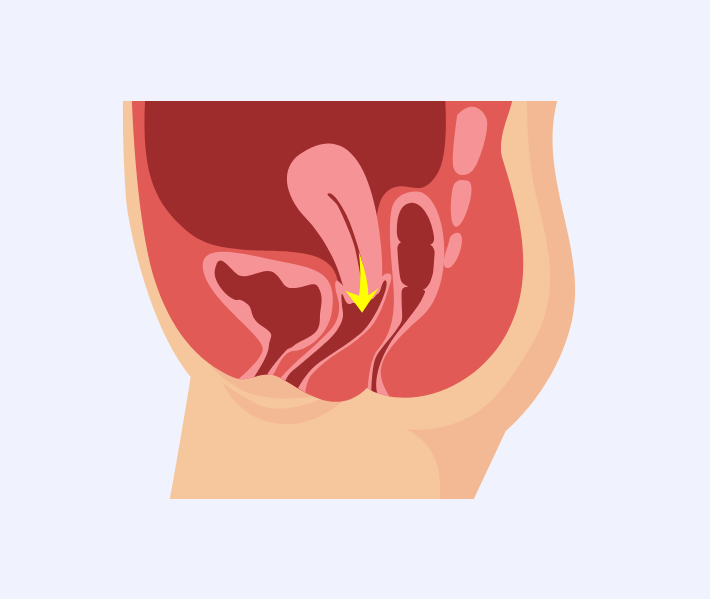Pelvic Organ Prolapse

Pelvic Organ Prolapse (POP): Lesser-known Facts!
|
Pelvic Organ Prolapse in Dubai: Overview
Pelvic organ prolapse (POP) is a chronic condition that many women experience but often hesitate to talk about. This gynecological condition can lead to discomfort, pressure, urinary issues, and a feeling that something is “out of place.” While it can be distressing, you are not alone—many women silently struggle with this condition.
Dr. Marwa ElAjami recognizes the sensitive nature of this condition and offers compassionate, personalized care to help you navigate your journey. She understands that each woman’s experience is unique and renders a wide range of treatment options for pelvic organ prolapse in Dubai, from non-surgical therapies to advanced surgical techniques tailored to your specific needs and concerns.
What Causes Pelvic Organ Prolapse?
Several factors can cause the pelvic floor muscles to weaken:


Pregnancy and Childbirth
Vaginal deliveries, especially prolonged labor or multiple births, can strain and weaken the pelvic muscles.

Aging and Menopause
Estrogen levels decline with age, reducing tissue elasticity and weakening pelvic support.

Genetic Factors
Some women inherit weaker connective tissues, making them more prone to prolapse.

Chronic Pressure on the Pelvic Floor
Frequent heavy lifting, obesity, chronic coughing, or constipation can place excessive strain on the pelvic muscles.

Hysterectomy or Pelvic Surgery
Surgical procedures involving the uterus or pelvic organs may disrupt support structures, increasing the risk of prolapse.
Understanding Pelvic Organ Prolapse (POP)
Pelvic organ prolapse (POP) occurs when the muscles and tissues supporting the pelvic organs (bladder, uterus, rectum) weaken or stretch, causing one or more of these organs to descend or bulge into the vagina. While it can be distressing, effective treatments are available to restore pelvic health and quality of life.
Common Symptoms of Pelvic Organ Prolapse
Some women may experience mild discomfort, while others face significant interference with daily activities.
Common symptoms include:
- A feeling of pressure or heaviness in the pelvic area.
- A bulge or lump in the vagina.
- Difficulty with urination or bowel movements.
- Urinary incontinence or urgency.
- Pain or discomfort during intercourse.
- A feeling of something “falling out” of the vagina.
- Lower back pain.
Types of Pelvic Organ Prolapse
POP can affect different pelvic organs, resulting in various types of prolapse:
- Cystocele (Bladder Prolapse): The bladder descends into the vagina.
- Rectocele (Rectal Prolapse): The rectal area bulges into the vagina.
- Uterine Prolapse: The uterus descends towards the vagina.
- Enterocele (Small Intestine Prolapse): The small intestine descends into the vagina.
- Vaginal Vault Prolapse: Occurs after a hysterectomy when the top of the vagina descends.
Diagnosis and Evaluation
A pelvic exam is the primary method for diagnosing POP.
Our gynecologist/obstetrician will assess the degree of prolapse and may recommend additional tests such as:
- Urinary function tests to check for incontinence or retention.
- Pelvic ultrasound or MRI for a detailed view of the organs.
- Bladder function studies to evaluate the impact on urination.
Treatment Options for Pelvic Organ Prolapse in Dubai
Our POP expert, Dr. Marwa, will offer treatment for your condition as per the severity of symptoms and the patient’s overall health.
Non-Surgical Treatments
- Pelvic Floor Exercises (Kegels) – Strengthen the muscles supporting the pelvic organs and can help with mild cases.
- Pessary Devices – A removable medical device inserted into the vagina to provide structural support.
- Lifestyle Modifications – Maintaining a healthy weight, avoiding heavy lifting, and managing chronic cough or constipation.
- Hormone Therapy – Estrogen replacement therapy may aid in strengthening vaginal tissues in postmenopausal women.
Surgical Treatment Options
For moderate to severe prolapse, our doctor may recommend the following surgical interventions:
- Pelvic Floor Repair Surgery – Reconstruct the weakened tissues to provide better support.
- Hysterectomy (if needed) – In cases where uterine prolapse is severe, removing the uterus may be considered.
- Mesh or Graft Reinforcement – Uses synthetic or biological materials to reinforce pelvic structures.
- Minimally Invasive Techniques – Laparoscopic or robotic-assisted procedures offer faster recovery times.

Looking for Well-guided Treatment for Pelvic Organ Prolapse in Dubai?
Consult Dr. Marwa ElAjami
If you are struggling to manage pelvic organ prolapse, it is advisable that you reach out for expert care. Dr. Marwa ElAjami specializes in diagnosing and treating POP with a personalized approach. She makes sure that her patients find relief with the best outcomes. Whether through conservative lines of treatment or the latest surgical techniques, she is dedicated to helping women restore their pelvic health and overall well-being.
Get in touch with our POP specialist in Dubai for POP, Dr. Marwa ElAjami
Schedule your appointment today and take the first step toward better health and well-being.
